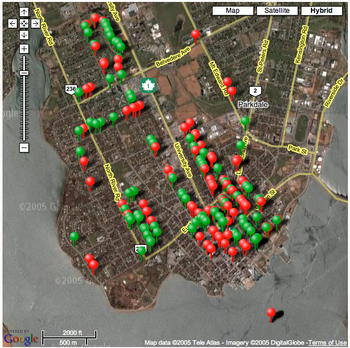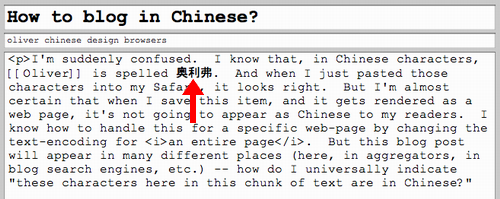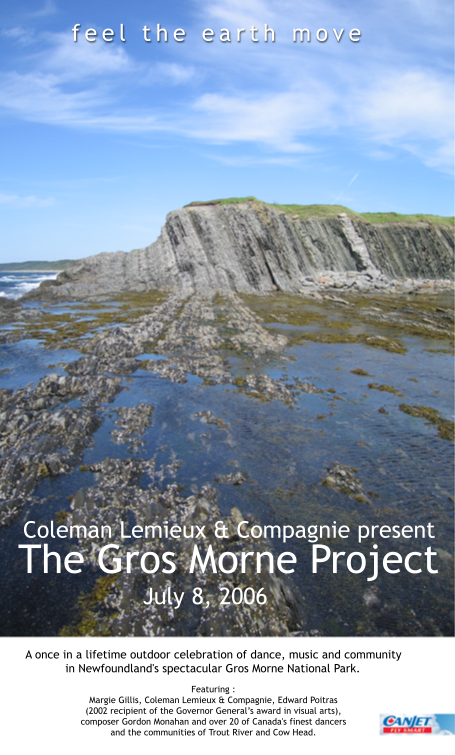A perfect storm of technology became available this morning that allowed Dad and I to go on a wardriving expedition around Charlottetown — an upgrade from my earlier warwalking experiments.
We ended up finding just over 200 wireless access points; put on a map they look like this (red markers are secured wifi access points, green markers are open ones):

In terms of gear, our setup looked like this:
- IBM ThinkPad T-20 laptop.
- NetStumbler software running under Windows 2000 on the laptop.
- An ancient Entrega 4-port USB hub.
- An ancient Holux GPS receiver, borrowed from Dan, plugged into the USB hub, and using some sort of weird “make my USB port into a serial port” driver.
- TRENDnet 54Mbps 802.11g Wireless USB 2.0 Adapter plugged into the USB hub.
- 400 W Eliminator Power Inverter from Canadian Tire.
- 2000 Volkswagen Jetta.
NetStumbler worked very well with Dad’s cheap USB wifi card and Dan’s GPS receiver; we needed the inverter in the car because the ThinkPad battery only lasts 15 minutes, and it only has one USB port where we needed two, thus the powered hub and the need to plug it in someplace.
I would be horrible if every asked to run a “grid pattern search” in a search and rescue situation, so our wardriving pattern wasn’t exactly comprehensive; we tried to get a representative sample from several neighbourhoods, but my sense is that there are 10-20x more access points out there that we missed.
Not sure how that one marker ended up out in Charlottetown Harbour — we didn’t actually drive the car out there.
If you want to fool with the raw data we gathered yourself, here are a couple of files:
I created the Google Maps map and the Google Earth datafile using the excellent GPSVisualizer site: it simply slurps in the NetStumbler files and spits out maps. Neato.
Some kids go hunting with their Dad, some kids play ball; I run wires all around my Volkswagen and go hunting for radio signals with my Dad.
I’m suddenly confused. I know that, in Chinese characters, Oliver is spelled ???. And when I just pasted those characters into my Safari, it looks right. But I’m almost certain that when I save this item, and it gets rendered as a web page, it’s not going to appear as Chinese to my readers. I know how to handle this for a specific web-page by changing the text-encoding for an entire page. But this blog post will appear in many different places (here, in aggregators, in blog search engines, etc.) — how do I universally indicate “these characters here in this chunk of text are in Chinese?”

Postscript: As expected, my Chinese characters ended up as “???”. This might be because of limitations in the MySQL database where I’m storing the post, or because of text encoding problems in the browser. Or maybe I’m just in the dark. Please advise.
In September of 1992 I spent 36 hours on Prince Edward Island. It was my first time here — a quick vacation on the way back from driving a friend from Ontario to Halifax. The flip of a coin sent my travel-mate and I to the Island rather than into New Brunswick. Coming off the ferry, we walked into the tourism information centre in Borden only to find that, given that the season was over, it had been re-purposed as a kindergarten. We visited Cedar Dunes Provincial Park and the lighthouse at West Point, came into Charlottetown for a night and stayed at Strathgartney, and did a little touring around in-between. I thought it was the most beautiful place I’d ever been.
I loved PEI so much that six months later Catherine and I were living here.
We forgot to leave.
The CBC is reporting that the theme of this year’s PEI tourism marketing campaign is “P.E.I. isn’t just a nice place to visit it could change your life.” My old colleague Greg Arsenault from Tourism PEI is quoted as saying “The trick will be to show how Prince Edward Island changes people.”
As someone whose life was dramatically changed by a visit to the Island, I completely agree with this thrust.
Above and beyond just the tourism economy, I think it’s high time Islanders stop being so timid about how special and different and transformative a place we live in. The world does need a little more Prince Edward Island.
Of course it’s entirely possible that the Grey Worldwide (the Island’s new agency) could screw this up entirely, and leave us with some wacky half-baked cartoon of a vision of the Island’s super-powers. But as a starting point, this is one of the better ideas I’ve seen, and if they do it right, it could be dramatic.
Out with “come play” and in with “come rock your world.”
Olle has joined the PlazesPHP development team, and has made good strides with generalizing the code today so that its “grab the MAC address” features can be made to work more universally.
This is my first “co-creation” experience, and it’s enabled by SVN and the SVN repository I set up for all my open source meanderings. It was quite neat to sudden see the revision number on the code uptick without having to do anything myself.
My next goal is to start building a few useful sample apps on top of the new PHP class.
We’ve started to roll out RSS feeds at YankeeMagazine.com. My favourite is the Recipes RSS (feed URL): a stream of new recipes, both from YANKEE editors and from YankeeMagazine.com readers. There are also individual feeds for each recipe category: a feed for vegetable recipes for example.
This is a neat use of RSS, because it lets users look at recipes from a completely different angle — it’s not search, it’s not browse, it’s “let me know.”
I spotted this sign in a greenhouse of the Conservatoire et Jardin botaniques de la Ville de Genève — the botanical gardens in Geneva:

Every time I read the sign, it seems vaguely erotic to me. Sort of like “words I should have heeded in my twenties.”
The lid was lifted off the interesting new coComment service at LIFT and I’ve started using it today. While coComment supports most popular blogging tools, it doesn’t have out of the box support, nor any documentation, for bending your home-brew blogging tool to support it.
Fortunately, it’s relatively easy to tweak things; I did a little reverse engineering of their forms processing, and the result is this little HOWTO that shows how I modified my own comments system, using coComment’s TypePad support as a model, to make comments here “coComment ready.”
Feel free to leave comments for this post if you’d like to test. Here’s what happens when I leave a comment for this post in my coComments “Your Conversations” page:

coComment is in a closed beta right now, but Laurent is has advice for getting an invite code right now if you want to pick one up.
By way of experimenting with PHP5 and its new object model, I’ve put together the beginnings of an object-oriented PHP class for interacting with Plazes. See PlazesPHP for details and links to source.
This just in: Coleman Lemieux et Compagnie are building a day-long festival in Gros Morne National Park on July 8, 2006. Details to follow.

The best investment I’ve made towards making air travel less hellish is the $4.00 I spent at Shoppers Drug Mart on a set of expanding foam ear plugs. I’ve been using them every since we flew to Thailand in 2002, and they’ve made a really big difference.
While it’s immediately obvious that airplanes are very noisy places, you can’t really get a good sense of just how noisy they are until you slip in the ear plugs. While they don’t cut out all the noise, they do successfully take it from “brass band playing in your head” to “somebody mowing the lawn across the street.” The effect this has on letting you stay relaxed (or at least “less tense”) and on letting you sleep is dramatic. Who would have thought all that “white noise” could be so stress-inducing.
Noise-cancelling headphones, or in-ear earphones like the Shure e2c can have the same dramatic effect, but they’re bulkier, more expensive, and mostly useful if you want to pump sound through them (although I have heard of people using the Bose headphones without any external audio source, simply to cut out noise).
I’ve also found the ear plugs useful for getting to sleep after long international flights in noisy hotels (although you have to make sure you can still hear your alarm clock!).
I recommend purchase of a little case of 4 or 6 ear plugs, as inevitably one or two get lost along the way. Insertion technique is important too: you have to compress them into a thin tube, and then slide them into your ear so they when they expand they made a snug sound-killing fit. This take some practice and the first few times they’ll likely expand right out of your ear.
For more on the flying experience and its challenges, see this post on Ian Williams’ blog.
 I am
I am